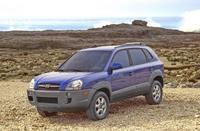2005 Hyundai Tucson Delivers ESP as Standard Equipment
FOUNTAIN VALLEY, Calif., Sept. 28 -- The ESP that comes as standard equipment on the 2005 Hyundai Tucson is not a mind-reading device, but drivers and passengers will agree the Electronic Stability Program provides real value. In fact, according to a preliminary study and a report issued September 23 by the National Highway Traffic Safety Administration (NHTSA), electronic stability control systems appear to be extremely effective in reducing single-vehicle SUV crashes, including rollovers. The study found a reduction of 67% in single-vehicle SUV crashes in vehicles equipped with electronic stability control systems, and a 63% reduction in single-vehicle SUV fatalities.
The NHTSA study said the systems can improve a vehicle's stability by electronically assisting drivers in dangerous situations. In most vehicles, the system improves the vehicle's lateral stability and, at the same time, combines the attributes of anti-lock brakes and traction control systems to help a driver avoid a potentially dangerous situation.
The all-new 2005 Hyundai Tucson SUV, which is going on-sale now across the country, offers the high-tech Electronic Stability Program (ESP) as standard equipment. Equipped with standard Electronic Stability Program, ABS, electronic traction control, side curtain airbags and seat-mounted side impact airbags, the Hyundai Tucson is the only vehicle sold in the U.S. priced under $20,000 (including destination charges) with all these outstanding safety features.
"The newly released NHTSA research demonstrates the value of electronic stability control in reducing SUV accidents. We think it's important that consumers become more aware of the value of this technology, as standard stability control plays a key role in differentiating the 2005 Hyundai Tucson from several other entry-level SUVs which either don't offer it or charge substantial premiums for it," said Hyundai's Vice President of Product Planning and Strategic Planning, John Krafcik. "In fact, the Tucson is the only vehicle sold in the U.S. for under $20,000 (including destination charges) to offer ESP, ABS, electronic traction control, side curtain airbags and seat-mounted side impact airbags as standard equipment," he added.
NHTSA evaluated the electronic stability control technology by studying fatal and non-fatal crashes from 1997 - 2003. The study examined crash statistics for vehicles equipped with electronic stability control systems as standard equipment. The agency also emphasized that the data is preliminary and that it will have more confidence in the effectiveness of the technology when studies can evaluate a larger cross-section of the vehicle fleet.
As with all Hyundai cars and sport utility vehicles sold in the U.S., the new Tucson SUV is covered by The Hyundai Advantage, America's Best Warranty. Hyundai buyers are protected by a 10-year/100,000-mile power train warranty, a 5-year/60,000-mile bumper-to-bumper warranty, a 5-year/100,000-mile anti-perforation warranty and 5-year/unlimited-mile roadside assistance protection.
Hyundai Motor America, headquartered in Fountain Valley, Calif., is a subsidiary of Hyundai Motor Company of Korea. Hyundai cars and sport utility vehicles are distributed in the United States by Hyundai Motor America and are sold and serviced by more than 640 dealers nationwide.



